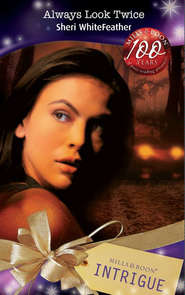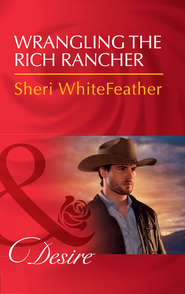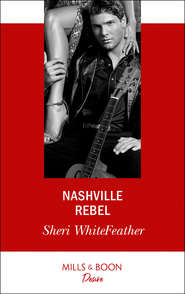По всем вопросам обращайтесь на: info@litportal.ru
(©) 2003-2024.
✖
The Ashtons: Walker, Ford & Mercedes: Betrayed Birthright / Mistaken for a Mistress / Condition of Marriage
Автор
Год написания книги
2019
Настройки чтения
Размер шрифта
Высота строк
Поля
Once again she reminded him of a bronze statue. Beautiful, breathtaking, far too aloof. Too bad he’d been taught to behave in museums, he thought. To keep his hands off the glass.
“Will you take it out?” she asked.
Take what out? he wondered, as his brain went numb.
She waited, and he blinked away his confusion. She then asked him to remove his ID from his wallet.
Complying with her request, he handed her his driver’s license. She scanned his identification, studying the photo. He knew it was a lousy picture. But those Department of Motor Vehicles cameras weren’t meant to be flattering.
“Satisfied?” he asked, his unbuttoned shirt sticking to his skin.
She returned his license. “I’ll talk to Mary when she gets home from work.”
“Then what?”
“I’ll call you and let you know when you can see her.”
Right, he thought. Because Mary was queen of the reservation. Or the rez. Or whatever the term for that ghetto plain was.
Aware of his animosity, Tamra sighed. “Your mother has been hurt. I’m only trying to protect her.”
No kidding? Well, he’d been hurt, too. He had no idea why Spencer had lied to him years ago, telling him that his mom was dead. And now Spencer was dead, gunned down by an unknown assailant.
Walker’s emotions were a flat-out mess.
He motioned to his room, where he’d left the door open. “I’ll be here. Do you need the number?”
“No, thanks. I already have it.” She paused, her voice turning soft. “Please don’t be angry, Walker. At least, not at Mary. She never quit missing you and Charlotte.”
His chest constricted, making it tough to breathe.
When he and Charlotte first moved in with Spencer, he used to whisper in the dark, telling her that Mommy and Daddy were angels, watching them from above. But eventually he’d settled into his new life, and he’d quit consoling his sister about the parents they’d lost.
Spencer had become Walker’s mentor, the only person he’d strived to impress. He’d chosen the older man over everyone, including Charlotte, leaving her to fend for herself.
“I’m not angry,” he said. But he was, of course. Somewhere in the pit of his stomach, he was mad as hell.
At himself, at Spencer, at Mary.
And at her, too. Tamra Winter Hawk.
The girl his mother had raised.
While the aroma of beef stew wafted through the house, Tamra helped Mary tidy the living room, dusting, vacuuming and fluffing pillows.
Mary turned off the vacuum and looked around. “This place is dingy, isn’t it? No matter what we do, it’s still an old mobile home.”
“It’s the same age as me. And I’m not old.” Besides, they had cozy furniture, indoor plumbing, heat in the winter and plenty of food in the icebox. To Tamra that was enough.
But she knew how nervous Mary was. She’d been clucking around like a chicken in the rain, preparing for her son but drowning in the fear of seeing him.
“Tell me about him, Tamra. Tell me about Walker.”
What could she say that would put the other woman at ease? “He’ll be here in about an hour, Mary.”
“I know, but I want to know what you thought of him. You never gave me your opinion.”
That was true. She hadn’t told Mary that he’d triggered her emotions. Or that his intensity reminded her of the past, of the years she’d spent in San Francisco, of the man who’d destroyed her heart.
She glanced at Mary, saw that she waited for a response. “He’s stunning.” Tall and lean, she thought, with just the right blend of power, of male muscle. “He was dressed casually.” And she’d noticed his chest, his stomach, the indentation of his navel. “But he doesn’t seem like a casual guy.”
Mary frowned. “You could tell he was rich?”
“Yes.”
“Fancy watch? Designer labels on his clothes?”
Tamra nodded, troubled by the insecurity in the other woman’s eyes. “But you know what?” she said, hoping to soften the blow. “He looks like his dad.” She’d seen photographs of David Ashton. She knew all about the farmer Mary had married. “And he resembles you, too.”
Walker’s mother relaxed a little. “He looked like both of us when he was young.” She paused, took an audible breath. “Do you think he’ll like stew?”
“Sure.” And if he didn’t, she doubted he would say otherwise. He would probably go through the motion of being polite. Of course, he hadn’t been particularly polite with Tamra. But she’d been harsh with him. She didn’t trust his motives, and she suspected he was going to complicate their lives.
Turn their Lakota world on its ear.
Most whitemanized Indians were brash and unyielding. Tamra knew because she’d been one herself. And in some ways she was still struggling with her identity.
“I wonder why he didn’t mention Charlotte,” Mary said. “Are you sure he didn’t say anything about his sister?”
“I’m sure. But you can ask him about her.”
“Yes, of course.” Nervous once again, Mary smoothed her blouse. She’d chosen a floral-printed top and blue pants, an outfit she’d purchased last summer. She didn’t fuss over her clothes and she rarely wore makeup. But this evening she’d put on lipstick. And she’d curled her rain-straight hair.
But even so, she looked older than her fifty-seven years. Her beauty had faded. Tamra had watched it dissipate. Mary had lived a hard life, and the lines in her face bore the brunt of her labor.
The pain of losing her children.
And now Walker was back. A stranger. A man with a distant heart. He hadn’t asked about his mom. Nothing that gave Tamra an indication that he cared.
“I’ll make the salad,” she said, needing to keep busy. The anticipation of entertaining Walker was making her anxious, too.
“I’ll bet he’s used to steak and lobster.” Mary put the vacuum cleaner into the hall closet, then frowned at their cluttered kitchen, at the simplicity of their existence. “Do you think Spencer knows he’s here?”
“I have no idea.” Tamra knew that Spencer Ashton had taken Walker and Charlotte away from their mother. He was responsible for the constant ache in Mary’s chest, for the tears she’d cried.
Tamra washed her hands, running them under the cold water. She couldn’t help being fiercely protective of the woman who’d raised her.
“Is it too hot in here?” Mary asked, stirring the stew. “Should we open another window?”











